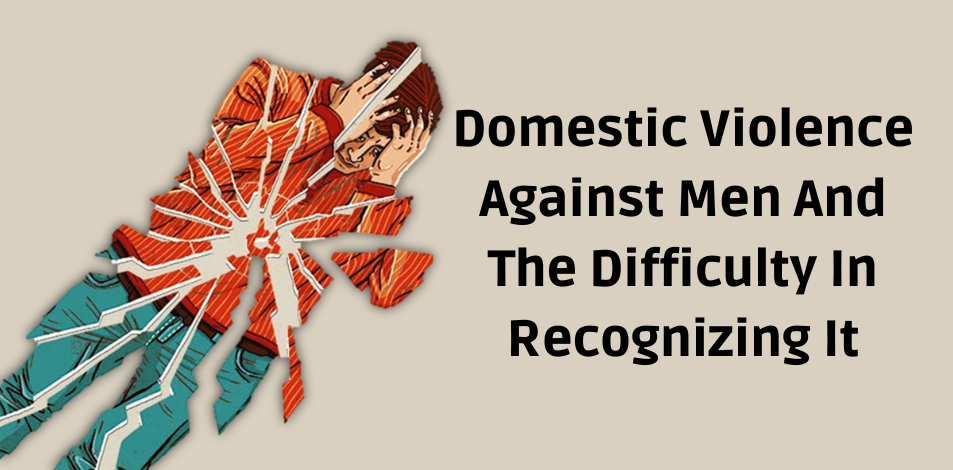
Just as domestic violence against women is a harsh reality in our society, so is domestic violence against men. Unfortunately, most people fail to acknowledge the dangers and prevalence of men as victims of domestic violence, due to years of social conditioning, brainwashing, and gender stereotypes.
the main points
Gender stereotypes make it difficult to see men as victims and women as perpetrators of domestic violence.
Female perpetrators tend to use different methods of abuse than men, often relying on psychological abuse and manipulation.
Male victims of abuse often feel isolated, embarrassed, and powerless, making it difficult for them to move forward.
Very little is known about domestic violence among heterosexual or “straight” men. There have been a few studies conducted involving men as victims, and those that have been completed focus primarily on same-sex relationships while adhering to the common stereotype that an adult man cannot be abused by a partner.
According to the National Coalition Against Domestic Violence, 1 in 9 men reports experiencing intimate partner violence, although it’s probably fair to assume that this statistic doesn’t take into account men’s tendency to underreport domestic violence because of gender roles and the attendant embarrassment.
Related: 9 Ways Your Partner Uses Guilt Trips You To Get What They Want
In my experience working with survivors of domestic violence, I find that female abusers usually act differently than men, in part because of their inability to overcome male partners, who tend to be more physically intimidating, and also because of how females are socialized in our society. .
Abusive women usually resort to non-physical forms of abuse on a psychological level, such as revenge-seeking behaviors (spreading rumors or revenge posts on social media), stalking, and emotional abuse. Women logically know that they probably won’t be able to outrun a man’s capabilities physically, but they’ve cultivated another, smarter skill: psychological warfare.
Unfortunately, I find that this type of abuse can cause more harm because it is so difficult to detect and prove. There are few legal structures in place to limit non-physical forms of domestic violence, which makes these tactics go unnoticed—and not stop—for much longer than physical violence.
There is a great deal of shame among male domestic violence survivors, with feeling emasculated, emasculated, and embarrassed being common feelings I hear expressed. Not only are these men battling the trauma of abuse, but they also struggle with battling societal stereotypes.
Many abuse survivors share common themes of self-doubt and frequent questioning of their abuse, but when the abuse is non-physical, these feelings exacerbate an already existing uncertainty. This can lead to people, including the victim, asking, “But is the abuse really that bad?” or “How much damage can one woman do?”
Until recently, the idea of heterosexual men being victims of domestic violence was hardly considered. Gender stereotypes in our culture leave little room for “straight” men to acknowledge that they are victims of any form of violence at the hands of women.
While it is true that the majority of domestic violence victims are female, this leaves little room for men to come forward in need of support. It’s a bit like sitting on a rescue boat: women and children first. Because of the inadequacy of our gender role expectations, male victims of abuse do not receive equal protection in the eyes of the law.
Related: How To Know If It’s Time to Let Go of Toxic Friends or Family: 15 Questions To Ask
Because of the intimate and transparent nature of domestic violence, it is normal for victims to feel isolated, and it is common for them to feel that they are the only ones going through the experience. Being male in our culture adds another element of shame, due to men being socialized as being unable to discuss feelings and interests with others.
Most people assume that a man will be able to stop any unwanted acts of domestic violence and therefore don’t take it seriously when such instances inevitably arise. This creates an unfavorable environment for supporting men through domestic violence.
If you think you are suffering, or suspect that a man you care about is going through an abusive situation, here are some signs to look out for:
Extreme jealousy or possessiveness – the inability to go to events or go out with friends alone, or allow other forms of privacy.
Fear of his partner’s reaction to text messages/calls/social media requests from other women.
The partner tells very personal details about the partner or the relationship out of spite, “mocking” him or her.
The partner threatens to be killed if he/she does/does not act in a certain way or do a certain thing that is asked of him/her.
Get other people to do their dirty work – ask friends to drive by his house, or otherwise check on him.
Bragging about trying to get him fired from his job or some other “punishment” for leaving the relationship.




